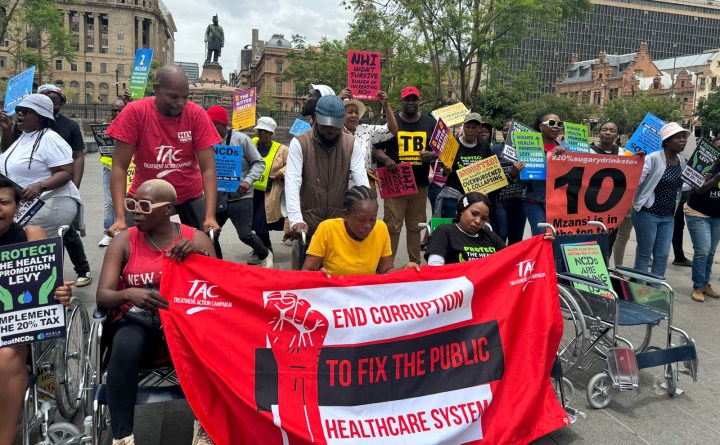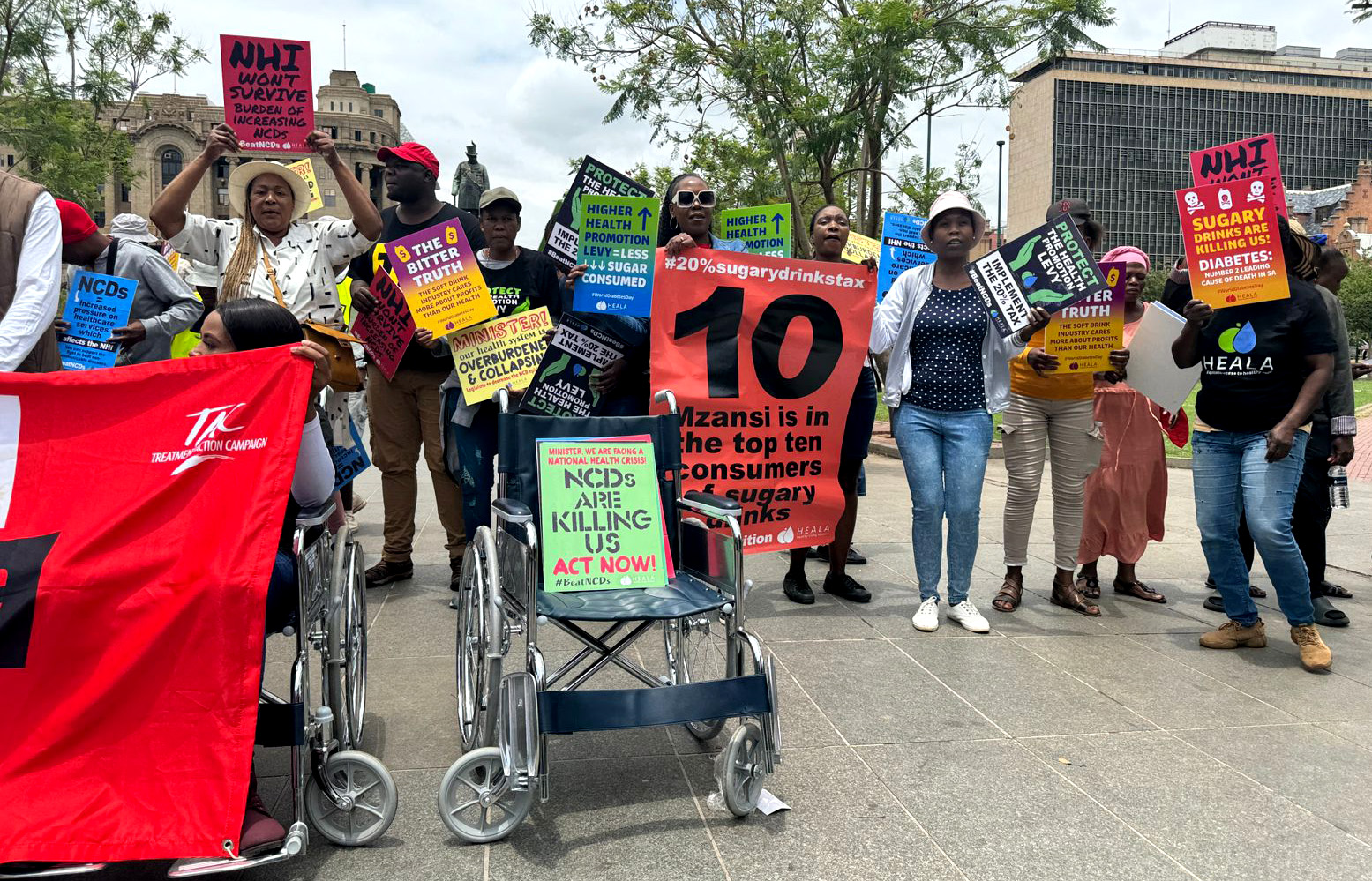SUGAR TAX
Hike tax on sugary drinks and save lives – and R5bn – say health activists

On World Diabetes Day, the Healthy Living Alliance and Treatment Action Campaign urged the government to increase the Health Promotion Levy to 20% to tackle the rising consumption of sugar-sweetened beverages to ‘make a healthier South Africa’.
On Tuesday, 14 November, activists, researchers and residents gathered outside the National Treasury offices in Church Square, Pretoria, to call for Finance Minister Enoch Godongwana to increase the Health Promotion Levy from 11% to 20%.
On 1 April 2018, South Africa introduced the Health Promotion Levy (HPL), a tax targeted at the sugar content of sugar-sweetened beverages at a rate of R0.021 ($0.0014 equivalent) per gram of sugar over a tax-exempt threshold of 4g of sugar per 100ml to control consumption of sugary products and promote healthy choices in beverages and food.

On #WorldDiabetesDay, the Healthy Living Alliance and the Treatment Action Campaign demand the government to increase the Health Promotion Levy to 20% to tackle the rising consumption of sugar-sweetened beverages. They picketed outside National Treasury offices in Pretoria on Tuesday. (Photo: Zukiswa Zimela)
That year, public sector costs for diagnosed and undiagnosed diabetes patients totalled R21-billion. Health activists say increasing the levy would save lives and lessen the burden of healthcare costs on the government.
“[Increasing] the Health Promotion Levy to 20% could save R5-billion in healthcare costs over the next two decades,” said the Healthy Living Alliance (Heala).
In South Africa, deaths due to major non-communicable diseases such as cardiovascular diseases, cancer, diabetes and chronic lower respiratory diseases increased by 58.7% over 20 years, from 103,428 in 1997 to 164,205 in 2018.
Heala policy and research manager Angelika Grimbeek said, “We want to say to Treasury, enough is enough. They have been delaying the increase of the Health Promotion Levy for years now. It is there to protect South Africans; the idea is to limit the number of sugary drinks South Africans consume.”
Grimbeek said the levy can also generate money for the government.
“Sitting at 11%, it generated R8-billion in three years. That’s a lot of money the government could be using [if it was increased to 20%],” said Grimbeek.
She said the levy has been shown to reduce the amount of sugary drinks consumed by people, especially those in lower-income homes who often bear the brunt of the health outcomes of food insecurity and malnutrition.
Read more in Daily Maverick: Diabetes is South Africa’s second-biggest killer disease: hiking the sugar tax would help
Protesters delivered their memorandum to Lutendo Ramalebana, the director of corporate services at the National Treasury, who said she would send it to the Treasury and revert to the civil society organisations.

(Image supplied: Healthy Living Alliance)
Ramalebana didn’t say when the Treasury would respond, but the organisations gave her 21 days to communicate with them on their deliberations or they would come back to protest and continue lobbying for the increase of the levy.
The demands in the memorandum include:
- A retraction of the two-year moratorium on increasing the HPL, with the increase starting immediately or within the 2023/24 financial year.
- An increase of the HPL to the recommended 20% rate to achieve better health and financial results, with necessary annual inflation-related increases thereafter.
- Urgent public consultations to decrease the 4g threshold and expand the HPL to include 100% fruit juices.
- Minimise austerity measures and budget cuts that impact health and social welfare programmes by ring-fencing the health promotion levy increase to 20%.
Grimbeek claimed the delay in increasing the levy was due to the food and beverage industry’s influence and warnings that increasing the levy would result in job losses.
“They often use this big scare tactic of job losses, but we know the industry can reformulate their use of sugar cane. We need to stop using that as an excuse.
“We are calling on the National Treasury to take the health of the nation into account,” said Grimbeek.
Treatment Action Campaign Gauteng chairperson Monwabisi Mbasa echoed Grimbeek’s sentiments, adding, “All we need is the political will. We need obesity and non-communicable diseases to be curbed.”
Budget cuts
Mbasa also highlighted that austerity measures were having adverse effects on healthcare in the country.
“If I can give an example, 37 public hospitals have failed to comply with the Occupational Health and Safety Act, which means they can collapse or catch fire at any moment in time. A case in point is Leratong Hospital which had a ceiling collapse last week in a theatre.
“Another bone of contention is these budget cuts can make it hard to meet the ambitious goal of ending HIV by 2030,” said Mbasa.
He said 26 hospitals had complained about the shortage of food.
“It is inhumane. Treasury must retract that particular decision,” said Mbasa.
In the February budget, the Treasury allocated R259-billion to public healthcare. This was reduced by R24.1-billion in the Mid-Term Budget Policy Statement. HIV/Aids funding was cut by R1-billion.
“If they don’t respond in 21 days, we are prepared to call civil society organisations and picket here, even sleep here.
“We want the Treasury to commit to increasing the levy and we want to retract the austerity measures … we know the minister has to engage the President and the Cabinet, but failure to say anything will force us to take further actions to realise health rights for all,” said Mbasa. DM




















 Become an Insider
Become an Insider
INCLUDE NON NUTRITIVE SWEETENERS IN THE TAX CATEGORY AS LITERATURE SHOWS THEY ARE EQUALLY BAD
What is happening right now is that as the sugar tax goes up, following the commercial imperative to avoid / reduce the impact of the sugar tax on prices, large soft drink companies are reducing sugar in their drinks and replacing it with non-nutritive sweeteners on which they are not taxed.
The result is more and more NNS content in drinks and as mentioned above the latest literature I’ve seen highlights that NNS is itself bad, and in this instance increasing the sugar tax without including NNS is simply creating a frying pan and fire scenario.
…and I personally find NNS disgusting so there’s that 🙂